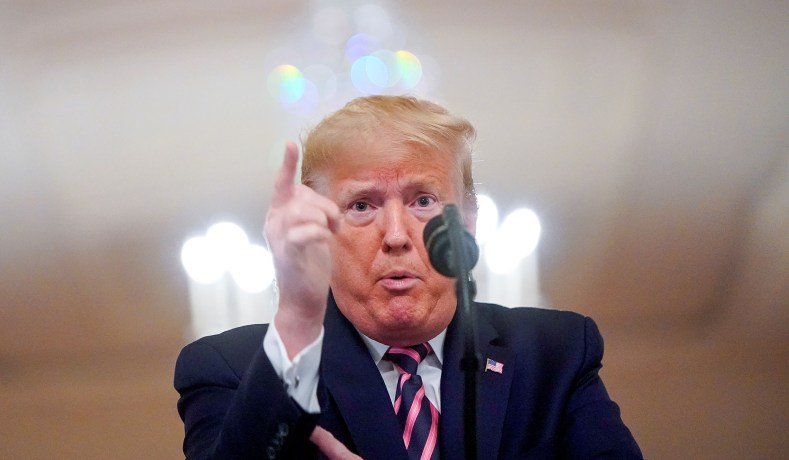
In response to No, Pro-Lifers Shouldn’t Vote for the Democratic Nominee
The Washington Post recently ran a column by Michael Gerson entitled “It is Difficult for Pro-Lifers to Vote Democrat. But it is Better than Trump.” Like many pundits, Gerson argues that the president exerts only marginal influence over abortion policy and therefore that pro-lifers would be better off trying to shift public opinion instead of engaging in electoral politics.
What he fails to acknowledge is that the actions of pro-life presidents often have a positive long-term effect on abortion policy, and the election of a Democratic president in 2020 easily could undermine decades of pro-life progress. Gerson broadly argues that President Trump has relatively little power to shape abortion policy, making two separate arguments. First, he states that Trump’s judicial nominees may or may not overturn Roe v. Wade. Second, he states that the reversal of Roe might not actually significantly lower the number of abortions. Both arguments are flawed.
It is true that we do not know which abortion cases that the U.S. Supreme Court will choose to hear and that we do not know how the Supreme Court will rule on any given case. That said, Trump’s judicial nominees certainly will be more sympathetic to the constitutionality of pro-life laws than the judicial nominees of any of the current Democratic presidential candidates. Even if Roe is not reversed, future judicial decisions that uphold existing pro-life laws still could lower abortion rates and build a culture of life.
Additionally, Gerson fails to realize that a vote for a Democratic presidential candidate is not a vote for the status quo on abortion. The Democratic Party has made a dramatic shift to the left on life issues. For example, every Democratic candidate opposes the Hyde amendment, which limits the ability of federal Medicaid dollars to pay for elective abortions. Multiple analyses have found that the Hyde amendment saves unborn lives; my 2016 Lozier Institute analysis, for instance, found that the amendment has prevented more than 2 million abortions since 1976.
If a Democratic president were to sign an appropriations bill that didn’t include Hyde protections, it is likely that the abortion rate would increase. The judicial nominees of a Democratic president would be far more likely to reverse precedent and strike down state-level pro-life parental-involvement laws and informed-consent laws.
Contrary to Gerson’s assertion, a reversal of Roe would almost certainly lower the abortion rate. In 2019 alone, six states enacted heartbeat bills that would prevent abortion after six weeks’ gestation, and Alabama enacted a law that would protect nearly all unborn children. Those laws, along with abortion restrictions in other states, have not been permitted to take effect because of abortion jurisprudence. If Roe were overturned, that would change.
In addition, a significant body of research shows that the incidence of abortion is sensitive to its legal status. Research analyzing the legal status of abortion in various states if Roe were reversed has shown that the U.S. abortion rate would fall. Of course, in a post-Roe world, abortion would still be legal in many states, but the abortion rate would decline in states with legislation protecting the preborn.
Finally, Gerson states that pro-lifers should focus more on educational rather than legislative efforts. He is correct that gains in public opinion would make it easier for pro-lifers to enact laws upholding the dignity of human life. But while it is true that culture affects policy, Gerson should realize that public policy can affect culture. Indeed, the damage done by Roe exceeded the legalization of abortion throughout all nine months of pregnancy; it shifted sexual and cultural mores in such a way as to make the enactment of pro-life laws more difficult. The enactment of pro-life laws might well have the reverse effect, shifting the culture is a more conservative direction and making it easier to enact additional pro-life laws in the future.
This column is likely one of what will be many attempts from commentators to discourage pro-lifers from supporting President Trump’s reelection. But the record of Trump’s first term merits enthusiastic pro-life support. His administration strengthened the Mexico City policy, which prevents foreign-aid dollars from supporting organizations that perform or promote abortions overseas. The “Protect Life” rule prevents Title X grantees from offering abortion referrals and resulted in Planned Parenthood withdrawing from the Title X program, which means the group will no longer receive about $60 million in federal funds annually. Currently, 192 of President Trump’s federal judicial nominees have been confirmed, including Supreme Court Justices Neil Gorsuch and Brett Kavanaugh. Pro-lifers would certainly do well to stay the course.


